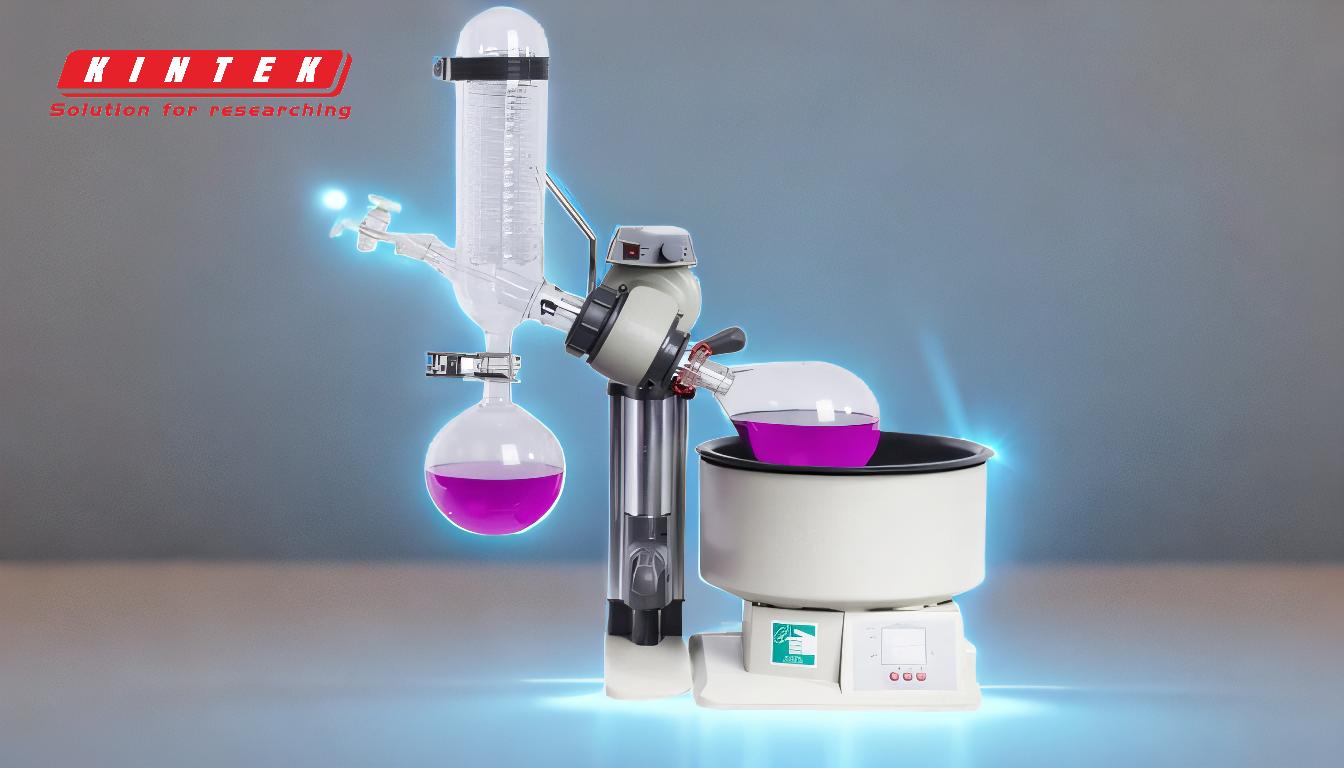A vacuum rotary evaporator is a versatile piece of equipment widely used in various industries and research fields. Its primary function is to remove volatile solvents from liquid mixtures under reduced pressure, enabling gentle and efficient evaporation. This process is crucial for tasks such as concentration, crystallization, drying, separation, and solvent recovery. Rotary evaporators are particularly valuable in industries like pharmaceuticals, biopharmaceuticals, chemical engineering, and biological research, where heat-sensitive materials require careful handling. They are also used in molecular cooking, gastronomy, and everyday applications like extracting water from juices or isolating essential oils from natural products.
Key Points Explained:

-
Concentration of Samples:
- Rotary evaporators are widely used to concentrate samples by evaporating solvents, leaving behind a more concentrated solution or residue.
- This is particularly useful in organic chemistry labs, where researchers need to isolate specific compounds from a mixture.
- Example: Concentrating plant extracts to isolate active pharmaceutical ingredients.
-
Crystallization:
- The controlled evaporation process helps in the crystallization of compounds, which is essential for purifying and isolating solid materials.
- This is crucial in pharmaceutical manufacturing to produce pure, high-quality drugs.
-
Drying:
- Rotary evaporators are used to remove moisture or solvents from samples, ensuring they are completely dry.
- This is important in the production of powders, granules, or other dry forms of materials.
-
Separation of Mixtures:
- By evaporating volatile solvents, rotary evaporators can separate components of a liquid mixture based on their boiling points.
- This is particularly useful in the petrochemical industry for refining complex mixtures.
-
Solvent Recovery:
- Rotary evaporators enable the recovery of solvents, which can be reused, reducing waste and costs in industrial processes.
- Example: Recovering ethanol or acetone in pharmaceutical production.
-
Purification of Samples:
- They are used to purify samples by removing impurities or unwanted solvents, ensuring high-purity end products.
- Example: Purifying essential oils or plant extracts for use in cosmetics or food products.
-
Applications in Pharmaceuticals and Biopharmaceuticals:
- Rotary evaporators are essential for handling heat-sensitive biological products, such as proteins or enzymes, that may degrade at high temperatures.
- They are used in the production of vaccines, antibiotics, and other biological drugs.
-
Use in Chemical Engineering and Research:
- In chemical labs, rotary evaporators are used for organic synthesis, reaction monitoring, and formulation development.
- They are also used in teaching and academic research to demonstrate principles of evaporation and distillation.
-
Molecular Cooking and Gastronomy:
- Rotary evaporators are used in molecular gastronomy to extract and concentrate flavors without losing volatile aromatic compounds.
- Example: Creating concentrated fruit essences or infusing oils with herbs.
-
Industrial Applications:
- In industries like CBD extraction, rotary evaporators are used to isolate cannabinoids from plant material.
- They are also used in the food industry to extract water from juices or other liquids.
-
Non-Heat Evaporation for Aromatics:
- The reduced pressure in rotary evaporators allows for low-temperature evaporation, preserving heat-sensitive compounds like aromatics.
- This is critical in industries like perfumery and flavoring.
-
Versatility Across Fields:
- Rotary evaporators are used in medicinal chemistry, chromatography, petrochemicals, and natural product extraction, showcasing their adaptability.
- They are indispensable tools in both industrial and laboratory settings.
In summary, vacuum rotary evaporators are essential for a wide range of applications, from research and development to large-scale industrial processes. Their ability to handle heat-sensitive materials and perform precise separations makes them invaluable in fields such as pharmaceuticals, chemistry, and food science.
Summary Table:
| Key Applications | Description |
|---|---|
| Concentration of Samples | Evaporates solvents to isolate compounds, e.g., pharmaceutical ingredients. |
| Crystallization | Purifies and isolates solid materials, crucial for drug manufacturing. |
| Drying | Removes moisture or solvents to produce dry powders or granules. |
| Separation of Mixtures | Separates components based on boiling points, e.g., petrochemical refining. |
| Solvent Recovery | Recovers solvents for reuse, reducing waste and costs. |
| Purification of Samples | Removes impurities, ensuring high-purity end products like essential oils. |
| Pharmaceuticals & Biopharma | Handles heat-sensitive materials like proteins and enzymes. |
| Chemical Engineering & Research | Used in organic synthesis, reaction monitoring, and academic research. |
| Molecular Cooking | Extracts and concentrates flavors without losing aromatic compounds. |
| Industrial Applications | Isolates cannabinoids, extracts water from juices, and more. |
Learn how a vacuum rotary evaporator can enhance your processes—contact our experts today!











